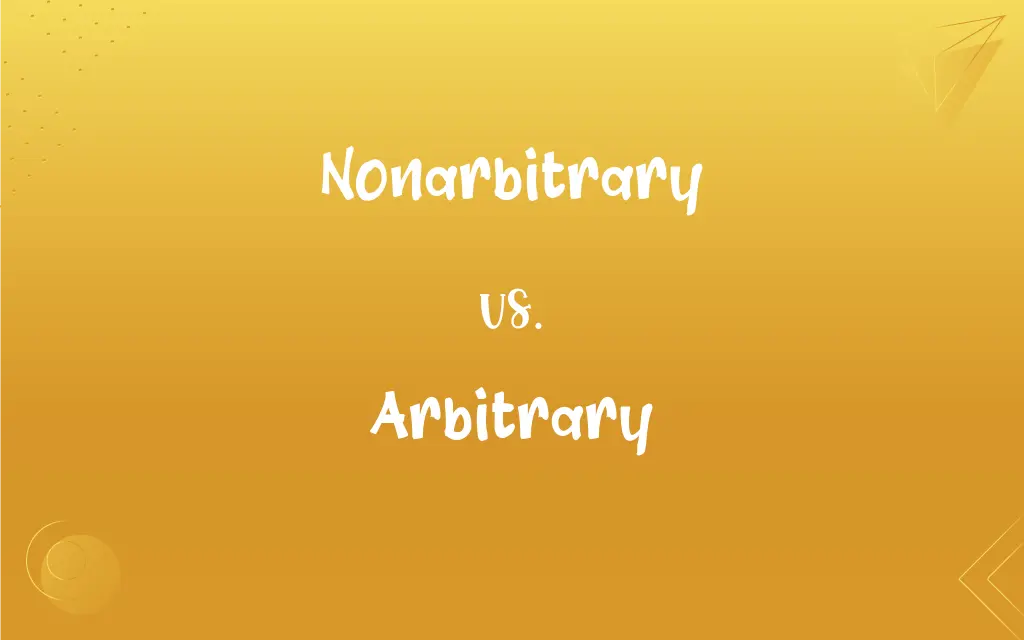Nonarbitrary vs. Arbitrary: What's the Difference?
Edited by Aimie Carlson || By Janet White || Updated on October 5, 2023
Nonarbitrary vs. Arbitrary: "Nonarbitrary" pertains to decisions or actions based on a system or reason, while "Arbitrary" refers to those made without a discernible principle or system.

Key Differences
Both "Nonarbitrary" and "Arbitrary" are terms used to describe the nature of decisions or choices. Nonarbitrary decisions are those grounded in a specific rationale, logic, or system. In contrast, Arbitrary decisions are made without any specific system, reason, or structure in place.
A Nonarbitrary approach implies consistency, predictability, and an adherence to set standards. Such decisions can often be justified or explained through established protocols or reasoning. Arbitrary decisions, however, can be unpredictable, often seen as capricious or made on a whim.
When considering design or creation, Nonarbitrary elements are deliberately chosen, having specific purpose or meaning. Arbitrary elements, conversely, might appear random, without any underlying intention or specific reason for their inclusion or design.
In legal or administrative contexts, Nonarbitrary actions follow a clear set of guidelines or principles ensuring fairness and consistency. Arbitrary actions in these contexts could be perceived as unfair or discriminatory, as they lack a clear guiding principle and may differ without reason from one instance to another.
Language offers an illustrative example: the association between words and their meanings in most languages is Arbitrary, as there's no inherent reason a "dog" is called a "dog." However, onomatopoeic words can be seen as more Nonarbitrary, as their form is directly linked to the sound or action they represent, like "buzz" for the sound bees make.
ADVERTISEMENT
Comparison Chart
Basis for Decision
Systematic, logical, or reason-based
Without a discernible system or reason
Predictability
Predictable due to set standards
Unpredictable and may seem random
In Design/Creation
Deliberately chosen with a specific purpose
Appears random without underlying intention
In Legal/Administrative Use
Follows guidelines ensuring fairness and consistency
Lacks a guiding principle, might be perceived as unfair
In Language
Direct association between form and meaning (less common)
No inherent connection between form and meaning (more common)
ADVERTISEMENT
Nonarbitrary and Arbitrary Definitions
Nonarbitrary
Not based on random choice or personal whim.
The selection was nonarbitrary, following established criteria.*
Arbitrary
Not grounded in principle or system.
Arbitrary rules can feel unjust and capricious.*
Nonarbitrary
Decision or action based on reason or system.
The grading system is nonarbitrary, with clear guidelines for assessment.*
Arbitrary
Lacking a clear plan, method, or system.
The story felt disjointed due to its arbitrary sequence of events.*
Nonarbitrary
Characterized by consistent application or method.
Her approach to teaching is nonarbitrary and is anchored in research.*
Arbitrary
Not consistent or systematic.
Arbitrary decisions often lead to confusion and unpredictability.*
Nonarbitrary
Demonstrating purpose or intentionality.
The artist's nonarbitrary use of color evoked specific emotions.*
Arbitrary
Based on whim or random choice without reason.
His selection seemed arbitrary, with no explanation given.*
Nonarbitrary
Grounded in established principle.
The company's nonarbitrary pricing model is transparent and fair.*
Arbitrary
Determined by chance, whim, or impulse.
The lottery is inherently arbitrary, as winners are chosen at random.*
Nonarbitrary
Not arbitrary.
Arbitrary
Determined by chance, whim, or impulse, and not by necessity, reason, or principle
Stopped at the first motel we passed, an arbitrary choice.
Nonarbitrary
Not subject to individual determination
Arbitrary
Based on or subject to individual judgment or preference
The diet imposes overall calorie limits, but daily menus are arbitrary.
Arbitrary
(Law) Relating to a decision made by a court or legislature that lacks a grounding in law or fact
An arbitrary penalty.
Arbitrary
Not limited by law; despotic
The arbitrary rule of a dictator.
Arbitrary
Based on individual discretion or judgment; not based on any objective distinction, perhaps even made at random.
Benjamin Franklin's designation of "positive" and "negative" to different charges was arbitrary.
The decision to use 18 years as the legal age of adulthood was arbitrary, as both age 17 and 19 were reasonable alternatives.
Arbitrary
Determined by impulse rather than reason; heavy-handed.
Arbitrary
(mathematics) Any, out of all that are possible.
The equation is true for an arbitrary value of x.
Arbitrary
Determined by independent arbiter.
Arbitrary
(linguistics) Not representative or symbolic; not iconic.
Arbitrary
Anything arbitrary, such as an arithmetical value or a fee.
Arbitrary
Depending on will or discretion; not governed by any fixed rules; as, an arbitrary decision; an arbitrary punishment.
It was wholly arbitrary in them to do so.
Rank pretends to fix the value of every one, and is the most arbitrary of all things.
Arbitrary
Exercised according to one's own will or caprice, and therefore conveying a notion of a tendency to abuse the possession of power.
Arbitrary power is most easily established on the ruins of liberty abused licentiousness.
Arbitrary
Despotic; absolute in power; bound by no law; harsh and unforbearing; tyrannical; as, an arbitrary prince or government.
Arbitrary
Based on or subject to individual discretion or preference or sometimes impulse or caprice;
An arbitrary decision
The arbitrary rule of a dictator
An arbitrary penalty
Of arbitrary size and shape
An arbitrary choice
Arbitrary division of the group into halves
FAQs
Is a nonarbitrary decision always better than an arbitrary one?
Not necessarily; context matters. Some situations may call for spontaneous, arbitrary choices.
Are all artistic choices arbitrary?
No, many artists make nonarbitrary choices rooted in technique, symbolism, or intent.
Can a decision appear arbitrary but not be?
Yes, if underlying reasons aren't apparent or communicated, it might seem arbitrary.
Can an arbitrary decision become nonarbitrary over time?
Yes, if consistent rationale or systems are later applied to it.
Are nonarbitrary decisions always logical?
They're based on a system or reason, but that doesn't mean they're always "logical" in a universal sense.
Can something be semi-arbitrary?
Yes, it might have some basis in reason but also elements of whim or randomness.
Why is nonarbitrary important in legal contexts?
It ensures fairness, consistency, and reduces potential biases.
Is predictability always linked to nonarbitrary actions?
Generally, yes, as they follow set standards or reasons.
Why might companies avoid arbitrary decisions?
For clarity, fairness, and to maintain trust among stakeholders.
Are there fields where arbitrary actions dominate?
Yes, in areas emphasizing creativity or spontaneity, arbitrary actions might be more common.
Do humans naturally lean towards arbitrary or nonarbitrary decisions?
It varies. While humans often seek patterns (nonarbitrary), they can also act on impulse (arbitrary).
How can I ensure my decisions are nonarbitrary?
Establish clear criteria, be consistent, and communicate reasons.
Is "arbitrary" always a negative term?
No, it's neutral. Context determines if it's negative or positive.
Do all cultures value nonarbitrary and arbitrary decisions similarly?
No, cultural contexts can influence how these types of decisions are perceived and valued.
Why might someone make an arbitrary decision?
Reasons vary: spontaneity, lack of information, or personal whim.
Can a language be entirely nonarbitrary?
Most languages have arbitrary elements, though some word forms (like onomatopoeia) might be less arbitrary.
Is intuition arbitrary or nonarbitrary?
It can be seen as both. While intuitive choices might feel arbitrary, they often have a basis in subconscious reasoning.
Can something start as arbitrary and be given nonarbitrary value later?
Yes, values or reasons can be assigned post-decision or post-creation.
Are arbitrary choices more authentic?
Not necessarily. Authenticity relates to sincerity, not the method of decision-making.
How does understanding these terms help in decision-making?
Recognizing if decisions are arbitrary or nonarbitrary can aid in predictability and understanding outcomes.
About Author
Written by
Janet WhiteJanet White has been an esteemed writer and blogger for Difference Wiki. Holding a Master's degree in Science and Medical Journalism from the prestigious Boston University, she has consistently demonstrated her expertise and passion for her field. When she's not immersed in her work, Janet relishes her time exercising, delving into a good book, and cherishing moments with friends and family.
Edited by
Aimie CarlsonAimie Carlson, holding a master's degree in English literature, is a fervent English language enthusiast. She lends her writing talents to Difference Wiki, a prominent website that specializes in comparisons, offering readers insightful analyses that both captivate and inform.































































